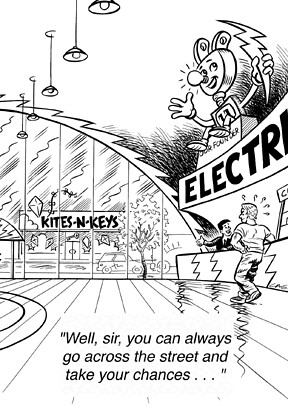or playing on the other side of the one-way mirror

A couple of days ago, out of the blue, I got a call from a market research firm asking me to participate in a focus group being organized for Pacific Gas and Electric, my local utility monopoly. Since they were paying and I'm not working regularly, this was a no-brainer -- I jumped at the chance for $100 for 2 hours!
Now there were a few things I didn't tell them -- after all, they didn't ask. When working on political campaigns, I've been a consumer of focus group data, designed questions for facilitators, watched tapes of focus groups and read transcripts of focus group sessions.
Above all, I've seen the effect of focus group data on politically naïve candidates and campaign committees. A skilled focus group facilitator can get people to spill their gut reactions to messages. And what ordinary US people feel about issues and politicians isn't pretty. An awful lot of people suffer chronically from a feeling they've been robbed, that someone else is getting what they should get, that no authority is to be trusted -- they are deeply disaffected from what we political junkies consider the normal stuff of political life. Candidates and committees wilt when confronted with these grievances in their focus groups.
What PG&E got from its focus group:
We were 12 middle class looking people, 2 African Americans, 10 whites (no Latinos or Asians so missing some 40% of the people in this city), only 1 apparently under 40, at least 3 retired people and one lady who acted drunk or drugged and kept blithering on, off topic. Our leader was "Steve," mid-40s, trimmed beard and sports shirt, resolutely cheerful, and as the evening went on, a little frayed around the edges.
We all started out being polite, careful. I can't know what others were thinking, but I assume we were all hoping to be vocal enough to be recruited for this again, but not so outspoken as to get nixed by the marketing company. PG&E was testing whether they could sell us "green" power at premium rates. Now PG&E is not popular in California; the company was part of the 'energy crisis' scam that enriched Enron and got Gray Davis booted. Moreover, it went through "bankruptcy" but somehow it is still the utility monopoly and we all pay higher bills. Once folks got going on PG&E, the group was venomous. It is not clear that most could ever be persuaded that PG&E wasn't somehow conning us.
Dumping on a big corporate monopoly and knowing it is at least potentially watching was fun! Getting paid for it was even better.
So what?
But putting on my political campaign hat again, what do I think the focus group proved, really? Truthfully, not much. PG&E learned again what they undoubtedly already know: they are hated. PG&E will somehow market "green" power -- they pretty much have to under state regulations. The focus group data will do is exactly what it often does in political campaigns: throw the purchaser back on the creativity and ideas of the marketing (or political) consultant who designed the process. I've long suspected that consultants use the animosity revealed in focus groups to make their clients feel dependent on them. You are not about to fire the only people who don't hate you.
Meanwhile, I'd certainly enjoy being paid to come back and bash a corporation again!
No comments:
Post a Comment